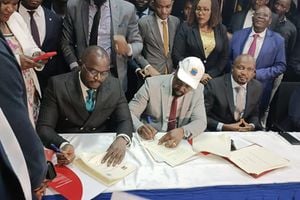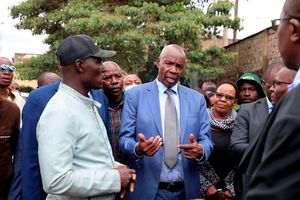Strive to follow the money scent

The government does not keep proper and accurate financial statements on its debts, making it impossible for auditors to ascertain the validity of Kenya’s debt position.
Controller of Budget (CoB) Margaret Nyakang’o’s lamentation was like the voice of one crying in the wilderness. Here is a sample of what she told the National Dialogue Committee meeting last week.
“I have been approving payments for public debt yet when I scrutinise the details, I cannot see the things I am paying for.” “You can’t trace the money we have been borrowing to any economic activity.”
Dr Nyakang’o narrated that an analysis and audit of loans taken by the government last year by her office—at the instigation of Parliament’s committee on debt—had revealed that the National Treasury was unable to trace the borrowed money to actual economic activity.
Yet these utterances by the constitutionally mandated gatekeeper of the public purse were not surprising. We have massive debts but are unable to tell how much we have repaid and what we owe.
The government does not keep proper and accurate financial statements on its debts, making it impossible for auditors to ascertain the validity of the country’s debt position.
Tuna scandal
The main contributory factors are the accounting crises at the heart of public finance management; the consequence of reluctance by successive administrations to tackle accounting reform; and the failure to transit the government to a double-entry and accruals accounting environment with a modern functioning ERP or Ifmis.
The government does not keep a creditors ledger, maintained on a double-entry, accrual system. What exists are mere Excel spreadsheets printed on glossy paper. You cannot pick out unrecorded hidden debts —just as happened in the infamous Tuna scandal in Mozambique.
Is it just a case of sloppy accounting?
Here is a true short story. In 2016, then-Auditor-General Edward Ouko was conducting a special audit on the receipt and usage of Kenya’s debut Eurobond that it had issued in 2014. He was on a mission to follow the money and to track where the borrowed funds had been spent.
A seasoned auditor, Mr Ouko realised that the task of following receipt and usage of the big borrowings which the government had been doing was almost impossible without an IT audit tool called Oracle Audit Vault. He went ahead and procured the software from Oracle Corporation, of the United States.
But when the ‘eating chiefs’ realised that Ouko was on a mission to make it easier to follow the money and track how borrowed money is spent and received, none other than President Uhuru Kenyatta went ballistic. The then-President publicly berated the Auditor-General for attempting to follow the payments all the way to the US!
Yanked off the plane
The members of a special team Ouko had assigned to audit Kenya’s account at the US Fed, in New York, through which the proceeds of the Eurobond had passed, were yanked off the plane at Jomo Kenyatta International Airport. The pressure on the Auditor-General did not end there: The Ethics and Anti-Corruption Authority started investigating the circumstances under which the Office of the Auditor-General had procured the auditing software.
The second significant point made by the CoB as she addressed the meeting at Bomas of Kenya was a spike in the incidence and cases of irregular and corrupt withdrawals from the public purse that had not been approved by Parliament.
Here is a bit of background of the issue Dr Nyakang’o was raising. Article 223 of the Constitution allows the government a small window to spend money that has not been appropriated by Parliament. But there are caveats. First, the money withdrawn must be for an emergency.
Secondly, this category of spending can only happen within two months after Parliament’s passage and approval of the appropriations. But according to Dr Nyakang’o, the law is honoured more in breach than practice.
Emergency spending
This is how she put it: “The appropriations are approved on June 30. A few days later, on July 5th, my office is inundated by applications for withdrawal of funds under Article 223.” According to her, the problem is compounded by the fact that most of the withdrawals being sought don’t belong to Art. 223 as they are not for emergency spending.
In the guise of emergency spending, profligate cabinet secretaries and principal secretaries have been inundating the office of the CoB for money to hire advisers from among their cronies, repair their fuel-guzzling limousines and purchase expensive red carpets, curtains and furniture from Turkey.
In terms of priorities, we are a country of contradictions. We pay hefty salaries to MPs when competent nurses out of medical training colleges take years to be absorbed even in rural dispensaries. Graduates of state-owned teacher training colleges have to wait for years to be employed, even in the context of unsustainable teacher-pupil ratios, and despite the fact that the government has been running a free primary education programme for several years.
To quote a government critic, we surely have our national priorities upside-down!





